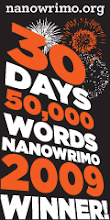"Miracles are a retelling in small letters of the very same story which is written across the whole world in letters too large for some of us to see." - C.S. Lewis
Everywhere you look today, there will be something that attracts your attention, whether it be media, sports, activities, shopping, or even schoolwork. There's always something to keep you busy, something to do or see. But the problem is, none of it has any substance. Our world is full of things that aren't real - that don't really matter. We need things that do matter.
That's why I've decided that I'm not going to have just another entertaining blog. We have enough meaningless distraction around us, but not nearly enough that makes us think. So this blog will be different. If nothing else, I hope it gets you thinking. And I don't want it to be just another opinion out there - I want, more than anything, to inspire you to take a new look at things and use your own common sense to make decisions.
This post, I'm going to get to the bottom line - what I believe about the origins of the earth and why. I haven't really written anything like this before, so bear with me. And it might be a little long, but I hope you keep reading.
I believe in the creation of the earth by an Intelligent Designer, as opposed to the hypothesis of evolution. And not because my parents say so, or because the Bible says so, but because I took the time to think about it (although I agree with both what the Bible says and what my parents believe).
I'm studying biology this year, and to many, reading into high school biology would mean strenghtening the student's belief in evolution. But that would only happen if the textbook teaches evolution, which nearly all, if not all public school textbooks do. The student would also have a part in that if he or she simply believes what they hear or read without actually thinking about it. Fortunately, I do not have a textbook that teaches evolution, and also thought the logic through. So, biology had just the opposite effect for me. I have found that it is dangerous to the hypothesis of evolution if a student thinks too much, or even at all, about what they are being taught. If they do, then the hypothesis of evolution very nearly disproves itself.
Take cells for example. I am fascinated by cells. Every biology textbook deals with cells. No matter what the viewpoint of the textbook's author, it will almost without exception teach the parts of a cell, their functions, what cells do what, and their properties. I'm no scientist, but from what I've seen, any self-respecting evolutionist author just might as well leave the whole discussion of cells and DNA right out of his textbook (and without those, everything else starts tumbling down).
The conundrum is a simple one. Read any semi-technical explanation of any type of cell and you will see that there is no such thing as a simple life form (even in prokaryotic cells, the "simplest" type, which are hailed as being the closest relations to our oldest ancestor). A cell has to perform at least eleven basic life functions to survive on its own. If even one of those functions is absent the cell will die. There is no margin for error. Random chance would have had to get it right the very first time - everything in place, formed correctly, with built-in protection from harmful chemicals, and the cell programmed knowing exactly what to do (including, I'm assuming, asexual reproduction). There was no time for a slow process of evolution or adaptation. It was either exactly right the first time or it was dead.
That's not so impossible, right? Well...uh...no. Let me illustrate for you just how impossible it is.
Let's take a look at your primordial soup now. Disregarding the fact that the environment had to be just right (air? water? a vacuum? a gas bubble? where did any of these elements come from, anyway?), we now observe a swirling mass of chemicals, the origins of which we have no idea. Allow me to use my imagination for a moment (after all, that's all that anyone's ever done regarding the origins of the earth, to a certain extent). Now, supposing that all the ingredients necessary to create a living cell were already in this soup, we settle back and wait for random chance to produce life (a process called spontaneous generation, or abiogenesis, which has never been observed in nature). A few million years go by...
We realize we might be waiting a while. Let's give random chance a hand. In fact, we'll go light on it by only asking it to produce DNA, not a functioning cell. A lot easier, right? You think?
We enter a lab primed with exactly the perfect conditions for generating life and pick out exactly the chemicals needed to create life, no more, no less (we don't even know them all, but let's assume we do just to make things easier). We let them swirl around together. We've helped random chance a lot, right? That's made the job easier. It should have, anyway.
Finally, we get more than a little frustrated. Random chance is just not doing its job, and we've worn out our copy of Robinson Crusoe. So we break down and bring in a team of experts - the most brilliant scientists in the world who know DNA as much as it can be known. "Create life from these chemicals," we tell them. So they set to work. They use all their collective ingenuity, forethought, care, and planning that a human can muster. They spend time, a lot of it, in that lab trying to create DNA.
But they can't do it.
"Why is that so important? That doesn't prove anything," you say. All right. Let me break it down for you.
It's true that random chance can do some things that humans can do. Take bingo, for instance. There is a chance that, say, a six ball will fall out at a specific time. But it is also true that a human can do everything random chance can do (they can make the six ball fall out).
Think of it this way. You take all the supplies needed to build a house and repeatedly drop them onto the ground in a heap (okay, the foundation is already there, just to make it easier). You do it again and again and again, but clearly you will never get a house, no matter how many times you drop the supplies onto the foundation, even if you did it for billions of years. We're talking a house complete with plumbing and electricity - not only are the odds astronomical, it's impossible. The catch is, a human CAN build a house, complete with plumbing and electricity, with exactly those materials. How much more impossible would it be for random chance to do something a human cannot? I don't think I need to remind you that DNA is so much more complex than anything involved in making a house, so much so that humans, who are the most intelligent living things known to inhabit this earth, haven't even learned everything there is to know about it.
Of course, if I started talking about ecosystems, reproduction, movement, and the human body...I'll be here all day. So I'm done now.
I think that what a person believes matters. In fact, it is the most important thing about them. I also think that what we believe should influence what we do. Random chance, by definition, is the most unreliable thing there is. That's why I'd rather not hang my fate on it. I refuse to trust that random chance did what a human cannot. Because really, all it boils down to is trust. No one was actually there when life originated - so I'm I'm going to trust that an Intelligent Designer created the universe, especially when this earth has the mark of intelligent design all over it.
My point is, don't just believe it. Think about it for yourself. Use your common sense - you could find that there's a whole lot you've been missing.
.jpg)







Excellent post, Madeline! Good job at presenting the facts clearly and logically. It was very convincing. :-) A whole book could be written on just how biology points to Intelligent Desgin, and so much more could be written about the rest of the sciences! Keep up the good work.
ReplyDeleteThanks, Brianna! That means a lot to me.
ReplyDelete